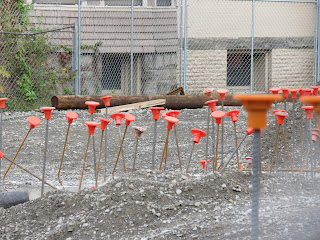On August 27, 2020, New York City's (NYC) Council amended the administrative code of the City of New York in relation to the definition of site safety training full compliance date. This amendment 2059-2020 goes into effect immediately and extends the compliance date to March 1, 2021. New York City Buildings posted the following notification.
 |
| Properly capped rebar |
- an Occupational Safety and Health Administration (OSHA) 10-hour class;
- an OSHA 30-hour class; or
- a 100-hour training program.
 |
| Recent OSHA 30-hour Construction Safety Course |
If you are wondering what an SST card, a limited SST card, a temporary SST card, or an SST supervisor card is, well you are not the only one! First, a Site Safety Training card (SST card) SST card, a limited SST card, a temporary SST card, or an SST supervisor card are cards that are issued by a New York City Department of Buildings Approved Training Provider (which at the time of my writing this, there are 102 training providers approved).
To get a limited SST card (which expires August 31, 2020) you must have taken one of the following training paths:
To get an SST card (which expires after 5 years) you must have taken one of the following training paths, this card will be required by September 1, 2020 (unless the NYC Council pushes this deadline back):
To get a limited SST card (which expires August 31, 2020) you must have taken one of the following training paths:
- OSHA 10-hour class with 20-hours of additional training:
- OSHA 10-hour
- 8-hour Fall Prevention
- 8-hour Chapter 33 (Site Safety Manager Refresher) or 4-hour General Electives and 4-hour Specialized Electives
- 4-hour Supported Scaffold User and refresher
- OSHA 30-hour class
- 100-Hour Training Program Approved by the Building Department
- Prior Experience
- 4-hour Fall Prevention
- 4-hour Supported Scaffold User
To get an SST card (which expires after 5 years) you must have taken one of the following training paths, this card will be required by September 1, 2020 (unless the NYC Council pushes this deadline back):
- OSHA 10-hour class with 30-hours of additional training:
- OSHA 10-hour class
- 8-hour Fall Prevention
- 8-hour Chapter 33 (Site Safety Manager Refresher)
- 4-hour Supported Scaffold User
- 4-hour General Electives
- 4-hour Specialized Electives
- 2-hour Drug and Alcohol Awareness
- OSHA 30-hour Class with 10-hours of additional training:
- OSHA 30-hour class
- 8-hour Fall Prevention
- 2-Hour Drug and Alcohol Awareness
- 100-hour Training Program Approved by the Building Department
- Prior Experience
- 4-hour Fall Prevention
- 4-hour Supported Scaffold User
- OSHA 30-hour class
- 8-hour fall prevention
- 8-hour Chapter 33 (Site Safety Manager Refresher)
- 4-hour Supported Scaffold User
- 2-hour Site Safety Plan
- 2-hour Tool Box Talks
- 2-hour Pre-task Safety Meetings
- 2-hour General Electives
- 2-hour Specialized Electives
- 2-hour Drug and Alcohol Awareness
 |
| By the full compliance date, SST Cards & Supervisor SST cards will be required on most construction sites |
Since SST Cards and Supervisor SST cards expire after 5 years, applicants must have completed training to renew the cards in the one-year period preceding renewal of the card (in other words if the card expires in September 2025, in the year from September 2024 to September 2025 you need to complete the training discussed below):
Related Articles:
- SST Card (8 Hours)
- 4-hour Fall Prevention
- 4-hour Supported Scaffold User
- Supervisor SST card (16 hours)
- 8-hour Fall Prevention
- 4-hour Supported Scaffold User
- 2-hour Tool Box Talks
- 2-hour Pre-Task Safety Meetings
Related Articles:






